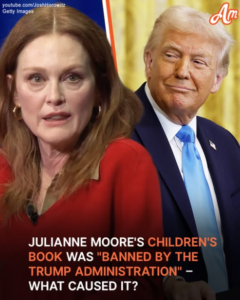In February 2025, acclaimed actress and author Julianne Moore expressed profound dismay upon discovering that her children’s book, Freckleface Strawberry, had been banned in certain U.S. schools managed by the Department of Defense. This revelation came to light through reports from organizations like Pen America, which monitors and advocates for free expression in literature.
Freckleface Strawberry, published in 2007, is a semi-autobiographical tale inspired by Moore’s own childhood experiences. The narrative centers on a young girl with red hair and freckles who embarks on a journey of self-acceptance, learning to embrace her unique appearance despite teasing from peers. The story aims to impart lessons on diversity, self-esteem, and the importance of accepting oneself and others.
Moore, the daughter of a military judge, spent part of her upbringing attending schools operated by the Department of Defense. Reflecting on her personal connection, she voiced her shock and sadness over the ban, stating, “I never thought I would see this in a country that values freedom.” She emphasized the irony of her book being inaccessible to children in similar educational environments to those she experienced, noting that the story was crafted to resonate with young readers facing challenges related to self-image and acceptance.
The ban’s origins trace back to policy changes implemented by the Trump administration. On January 26, 2025, Secretary of Defense Pete Hegseth announced the termination of Diversity, Equity, and Inclusion (DEI) programs within the Department of Defense, following an executive order from President Donald Trump. This directive led to the removal of certain educational materials, including Freckleface Strawberry, from school libraries and curricula. Critics argue that such actions undermine efforts to promote inclusivity and understanding among students.
Moore’s response to the ban has been one of active engagement. She has taken to social media platforms to raise awareness about the issue, sharing her disbelief and disappointment with her followers. In interviews, she has reiterated her commitment to fostering conversations around acceptance and diversity, underscoring the essential role literature plays in shaping young minds.
The controversy surrounding Freckleface Strawberry has ignited broader discussions about censorship, educational autonomy, and the role of government in regulating school curricula. Advocates for free expression contend that banning books with messages of self-acceptance and diversity deprives students of valuable learning opportunities. They stress the importance of exposing children to a wide range of perspectives to cultivate empathy and critical thinking skills.
In response to the ban, several educational and literary organizations have rallied in support of Moore and her work. Initiatives to provide Freckleface Strawberry to students through alternative channels have gained momentum, with community groups organizing book drives and readings to ensure the story reaches its intended audience. These efforts highlight a collective resistance against censorship and a dedication to preserving diverse voices in children’s literature.
As the debate continues, Moore remains steadfast in her advocacy for inclusive storytelling. She emphasizes that the core message of Freckleface Strawberry—embracing one’s individuality and fostering acceptance of others—is more pertinent than ever. Through her platform, she aspires to inspire meaningful dialogue and action to counteract the suppression of diverse narratives in educational settings.
In conclusion, the banning of Freckleface Strawberry in certain Department of Defense schools has sparked significant discourse on issues of censorship, diversity, and the impact of literature in education. Julianne Moore’s personal connection to the subject and her proactive stance serve as a catalyst for ongoing conversations about the vital need to protect and promote inclusive stories for young readers.
